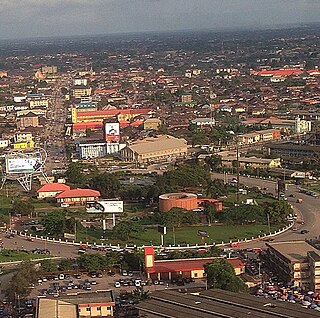
Benin City serves as the capital and largest metropolitan centre of Edo State, situated in southern Nigeria. Notably, it ranks as the fourth-most populous city in Nigeria, according to the 2006 national census, preceded only by Lagos, Kano, and Ibadan.

Edo, officially known as Edo State, is a state in the South-South geopolitical zone of the federal republic of Nigeria. As of 2024, the state was ranked as the 22nd most populous state (5,250,000) in Nigeria. The estimated state population is around 4,777,000 in 2022. Edo State is the 22nd largest state by landmass in Nigeria. The state's capital and largest city, Benin City, is the fourth largest city in Nigeria, and the centre of the country's rubber industry. Created in 1991 from the former Bendel State, it is also known as the heart beat of the nation. Edo State borders Kogi State to the north for 133 km and across the Niger River for 81 km to the northeast, Anambra State to the east for about four km across the Niger River, Delta State to the southeast and south for 350 km, and Ondo State to the west.
Ozoro is a city and the headquarter of Isoko North Local Government area of Delta State, Nigeria. It is one of the two administrative units in the Isoko region of Delta State, southern Nigeria. Ozoro had been incorrectly spelt Usoro in some older maps of Nigeria. Ozoro, the capital city of Isoko North, has a population of approximately 186,000 inhabitants.

Benson Idahosa University (BIU) is a private, Christian university in Benin City, Edo State, Nigeria. Previously named Christian Faith University (CFU), it was renamed in honor of Archbishop Benson Idahosa, a Charismatic Pentecostal minister from Benin City, Nigeria, and reflects his evangelical beliefs. He was the first president of the university. The current president of Benson Idahosa University, Rt. Rev. (Dr.) Faith Emmanuel Benson Idahosa, son of Benson Idahosa, is the Bishop of CGMi Faith Arena and Co-ordinator, Next Generation Leadership of the Church of God Mission.

Chief Festus Okotie-Eboh was a Nigerian politician who was the finance minister of Nigeria from 1957 to 1966 during the administration of Sir Abubakar Tafawa Balewa.
The Afemai people, also spelled Afenmai are a group of people living in the northern part of Edo State south geopolitical zone of Nigeria.

The Roman Catholic Diocese of Auchi is a diocese located in the city of Auchi, Edo State in the ecclesiastical province of Benin City in Nigeria.
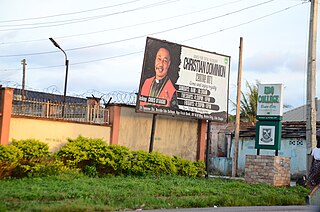
Edo College is a secondary grammar school in Benin City, Nigeria, the oldest in the Mid-Western Region. It was established in February 1937 and started as the Benin Middle School with forms, I, II and III. In April 1937, the school, with a total student enrollment of 76 pupils, moved from its temporary site at the old Government School, Benin City to a permanent site, the present Idia College premises. In 1973, the school further moved from Idia College premises to its present site along Murtala Mohammed Way, Benin City, Edo state in the federal Republic of Nigeria.
Igueben is a local government area of Edo State, Nigeria. Its headquarters are located in the town of Igueben, which has an area of 380 km2 (150 sq mi) and a population of 69,639 according to the 2006 census. The postal code is 310.
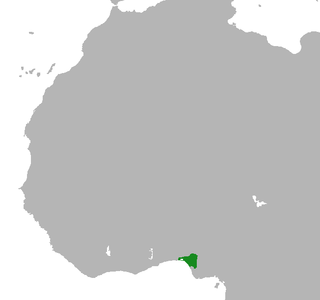
The Kingdom of Benin, also known as Great Benin or Benin Kingdom is a kingdom within what is now considered southern Nigeria. It has no historical relation to the modern republic of Benin, which was known as Dahomey from the 17th century until 1975. The Kingdom of Benin's capital was Edo, now known as Benin City in Edo State, Nigeria. The Benin Kingdom was one of the oldest and most developed states in the coastal hinterland of West Africa. It grew out of the previous Edo Kingdom of Igodomigodo around the 11th century AD; it was annexed by the British Empire in 1897.
The Okomu Forest Reserve is a forest block covering an area of 1081 km2 in Edo State, about 50 km west of Benin City, Nigeria. The Okomu National Park lies within the larger reserve, maintaining a small part of the forests that once covered the region as the last habitat for many endangered species.
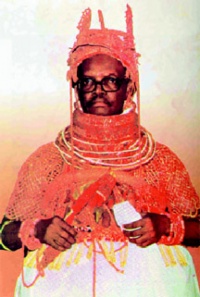
Erediauwa was the 39th Oba of Benin, traditional ruler of the Edo people in Benin City, Edo State, Nigeria. Formerly known as Prince Solomon Akenzua, Oba Erediauwa's full title was His Royal Majesty Omo n'Oba n'Edo Uku Akpolokpolo Erediauwa I. He was succeeded by Ewuare II.
Hakeem Belo-Osagie is a Nigerian businessman. He is chair of Metis Capital Partners an organisation focused on brokering and delivering attractive, large-ticket transactions in Africa to select blue chip international investment partners. He was listed by Forbes Magazine as the forty-first richest man in Africa in 2014.

Osagie Ize-Iyamu is a Nigerian pastor, politician, and a former Chief of Staff and Secretary to the Edo state government. He was the gubernatorial candidate of the Edo state People's Democratic Party for the 2016 Edo state gubernatorial election. He is currently a member of the All Progressives Congress (APC). Ize-Iyamu was the National Vice-Chairman, South-South Zone, of the defunct Action Congress of Nigeria (ACN).
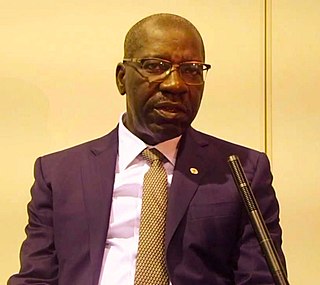
Godwin Nogheghase Obaseki is a Nigerian politician and businessman who served as the governor of Edo State from 2016 to 2024.

University of Benin Teaching Hospital (UBTH) is a multi-specialty healthcare service provider in West Africa. The hospital is located in Ugbowo, Benin City and was established on May 12, 1973 following the enactment of an edict (number 12) of the Nigeria National Health Act.

Enakhe is an Africa Magic original crime drama set in modern-day Benin City. It was directed by Victor Sanchez Aghahowa and features Alex Usifo, Ivie Okujaye, Philip Asaya, Lancelot Oduwa Imaseun and Lota Chukwu. It premiered on September 28, 2020 and airs on Africa Magic Showcase, DStv channel 151. It also streams on Showmax, at the same time as the broadcast on Africa Magic.
Gideon Obhakhan is a Nigerian politician and the immediate past commissioner for education in Edo State. He contested for the House of Representatives during the 2015 general election.

Matthew Aigbuhenze Iduoriyekemwen is a Nigerian politician, businessman and former commissioner representing Edo State in the NDDC. He was the member representing Ikpoba Okha LGA in the Edo State House of Assembly between 1999 and 2007. He is currently a member of the Peoples Democratic Party (PDP).

Edo literature includes both written and oral works in the Edo language by the Edo people of Nigeria. It has its origins in precolonial times and has evolved over time. The literature is a reflection of Edo culture and it includes various periods, genres, and authors. It is rooted in traditional expressions such as brass-casting, wood carving, and pictorial writing. The written form became more prominent during the colonial era with the adoption of the Roman script. Folk songs are a part of Edo literature and are a part of Edo cultural heritage. These songs serve as repositories of historical narratives, moral teachings, and cultural expressions.













